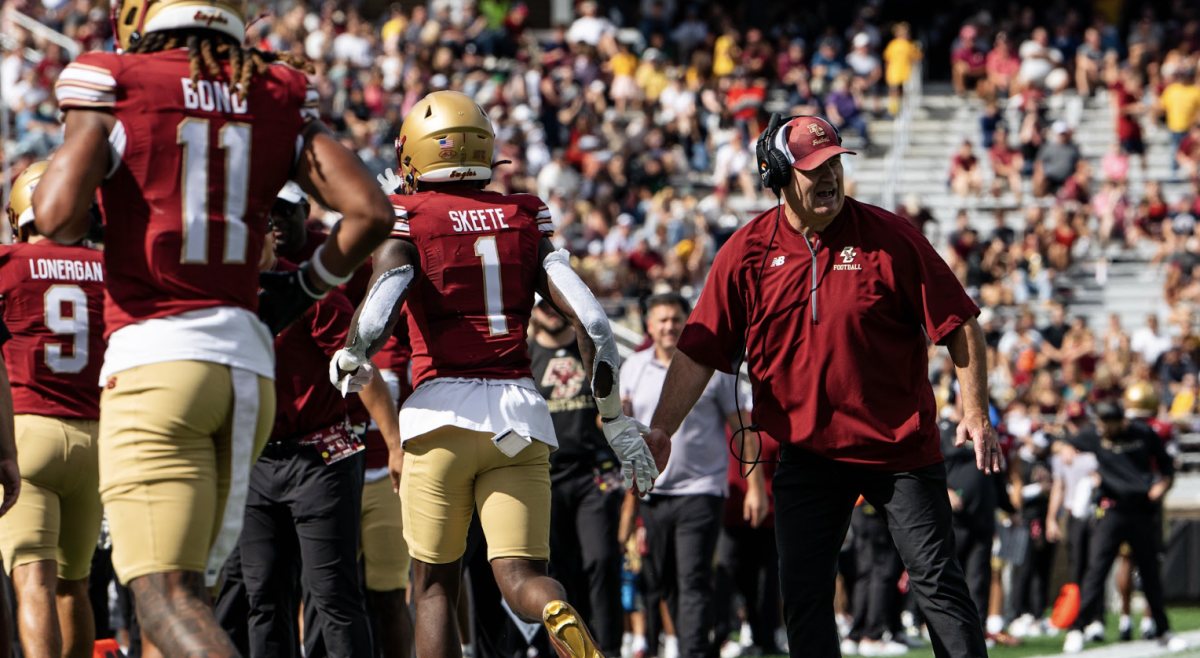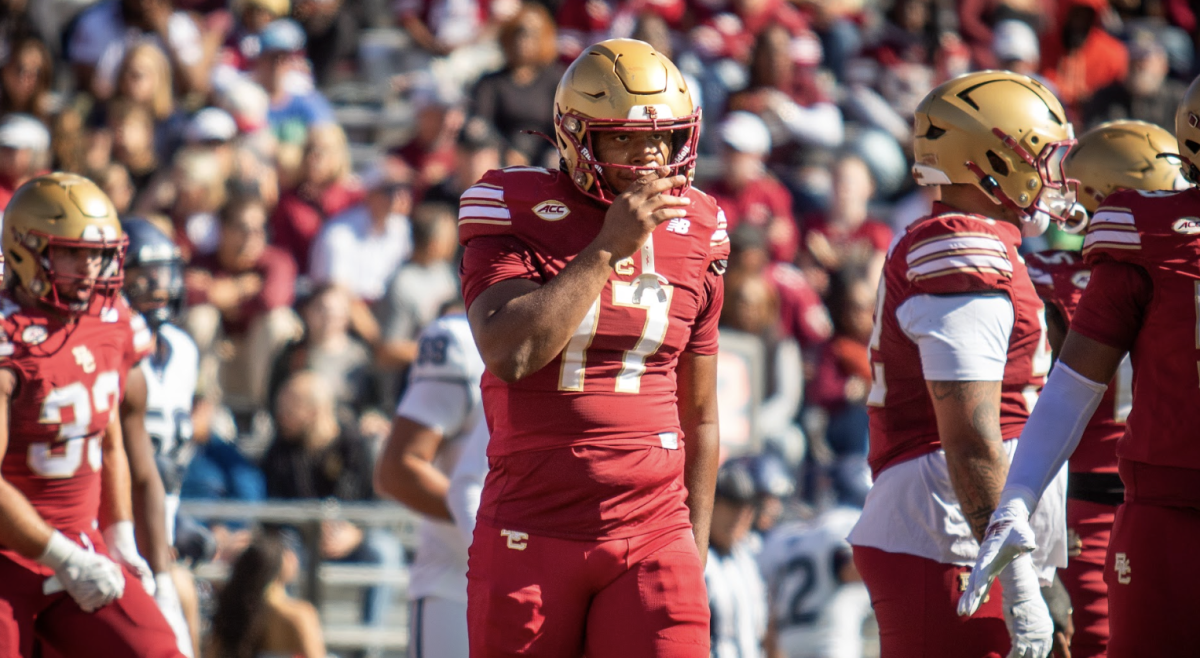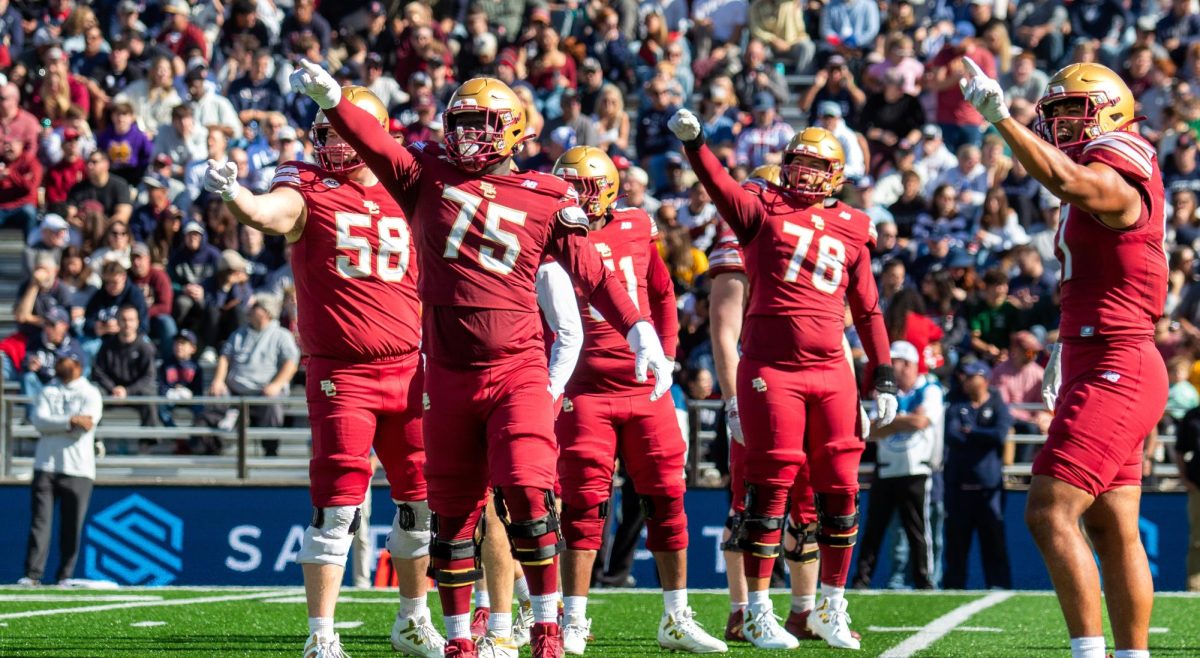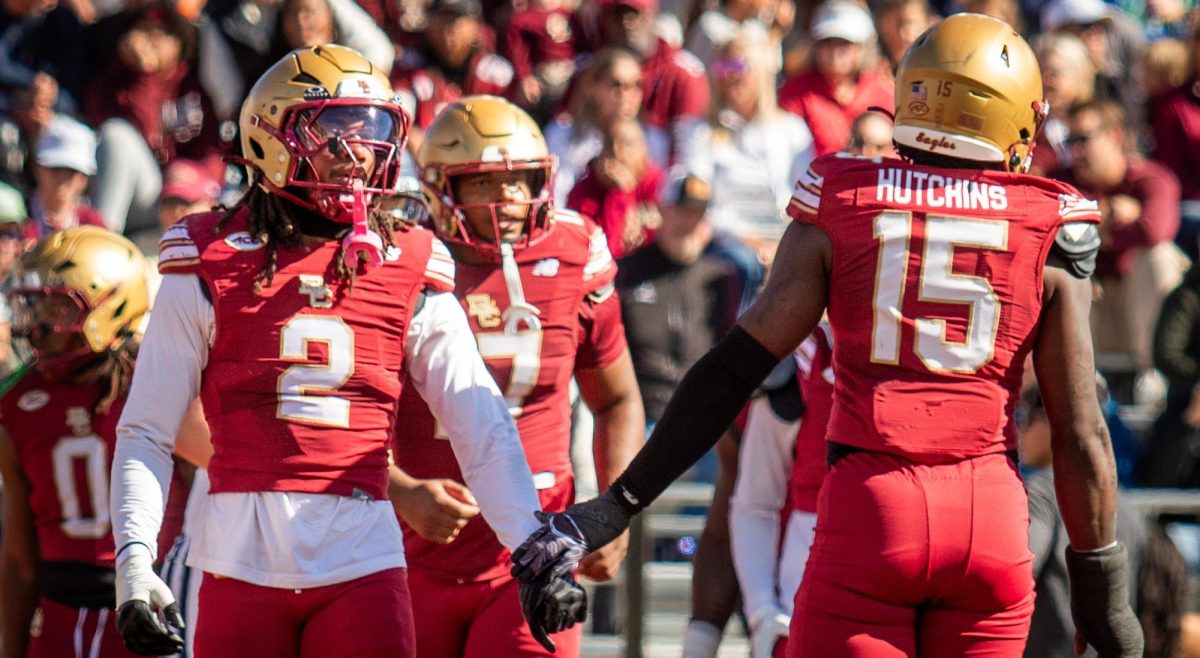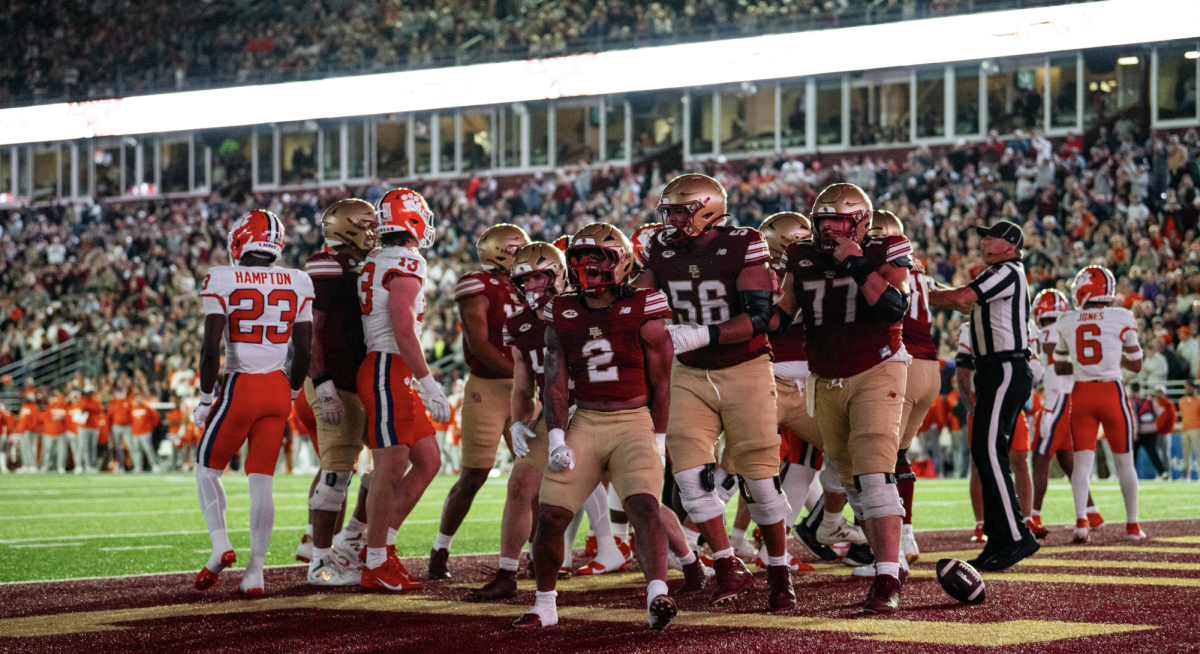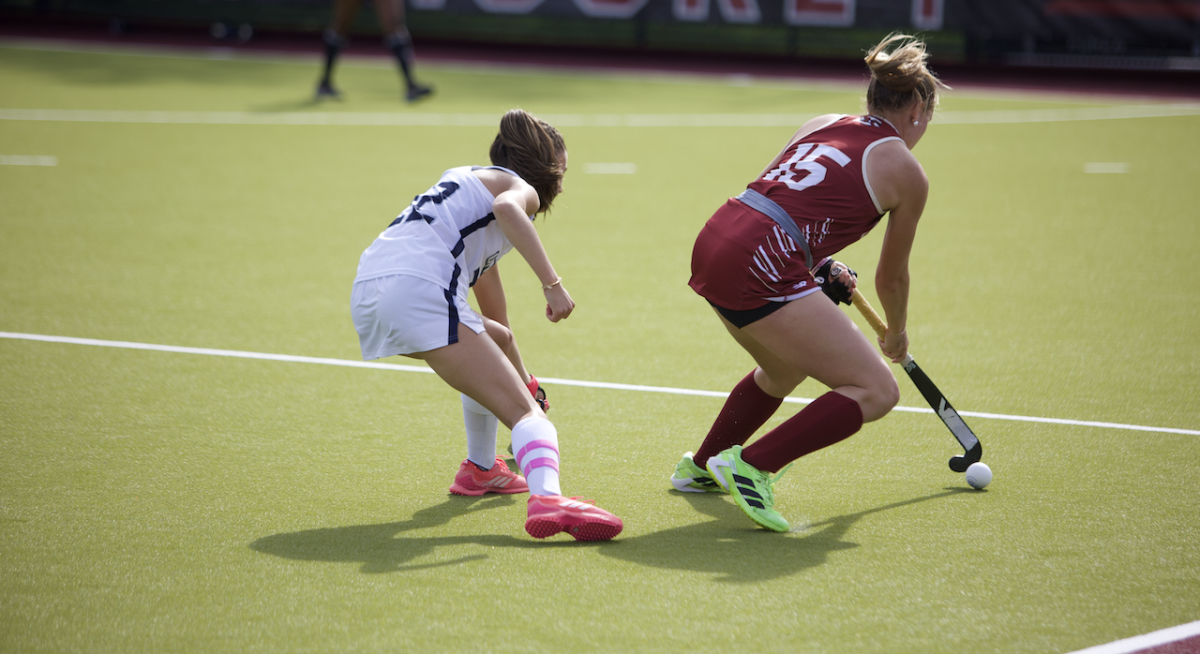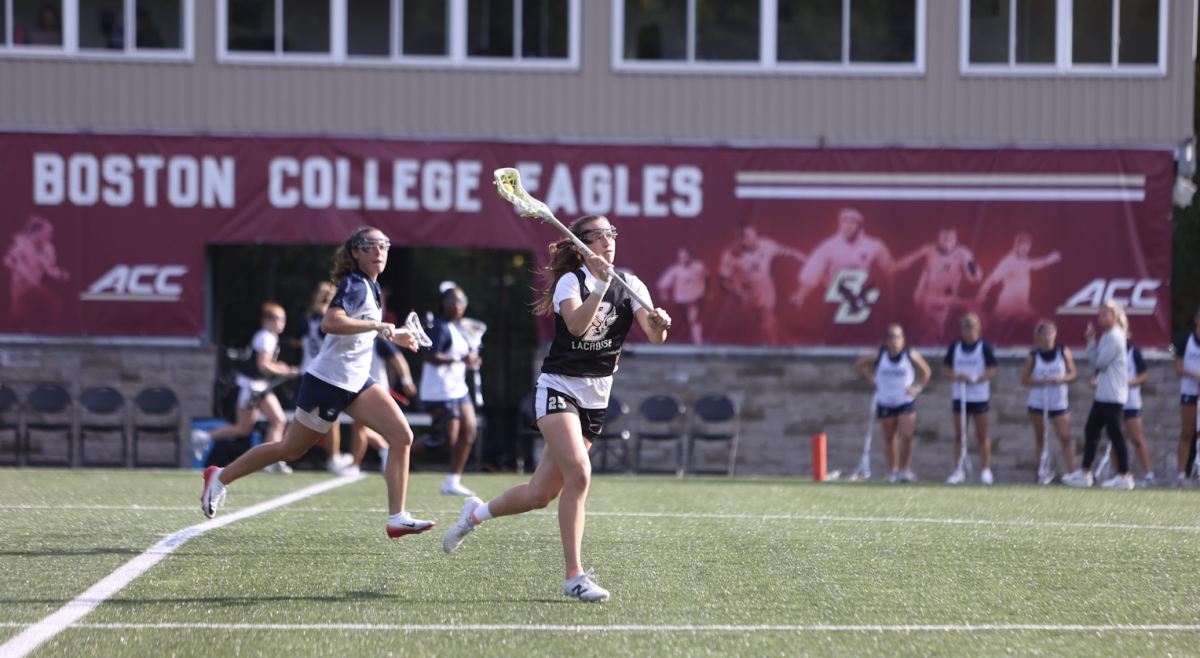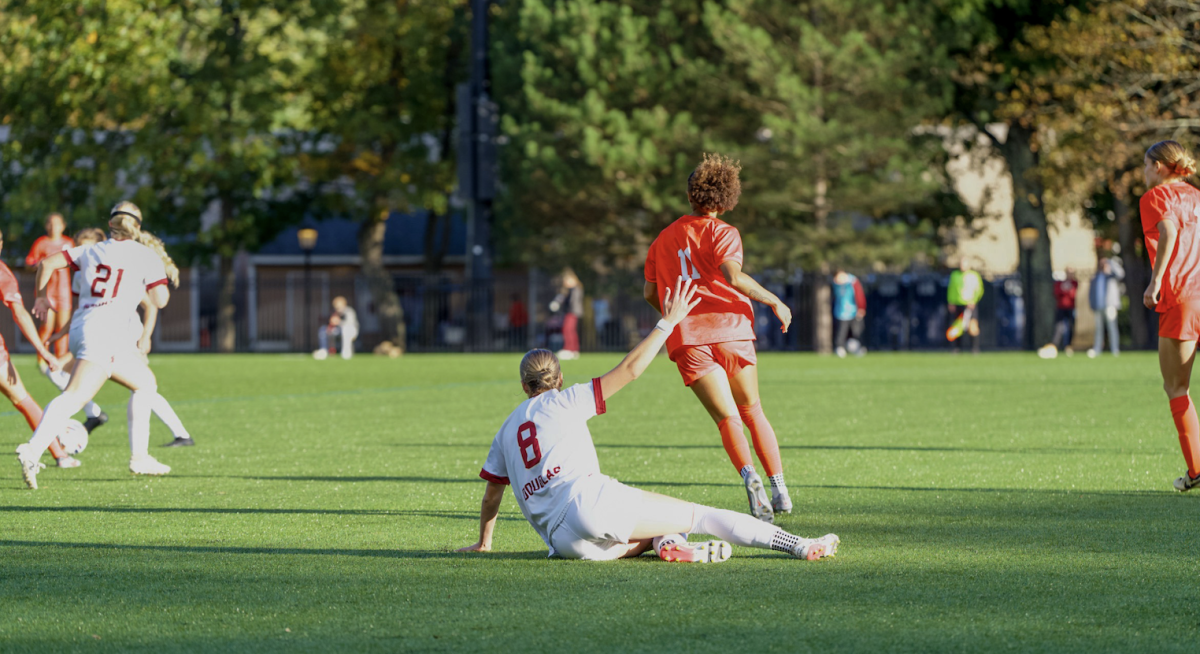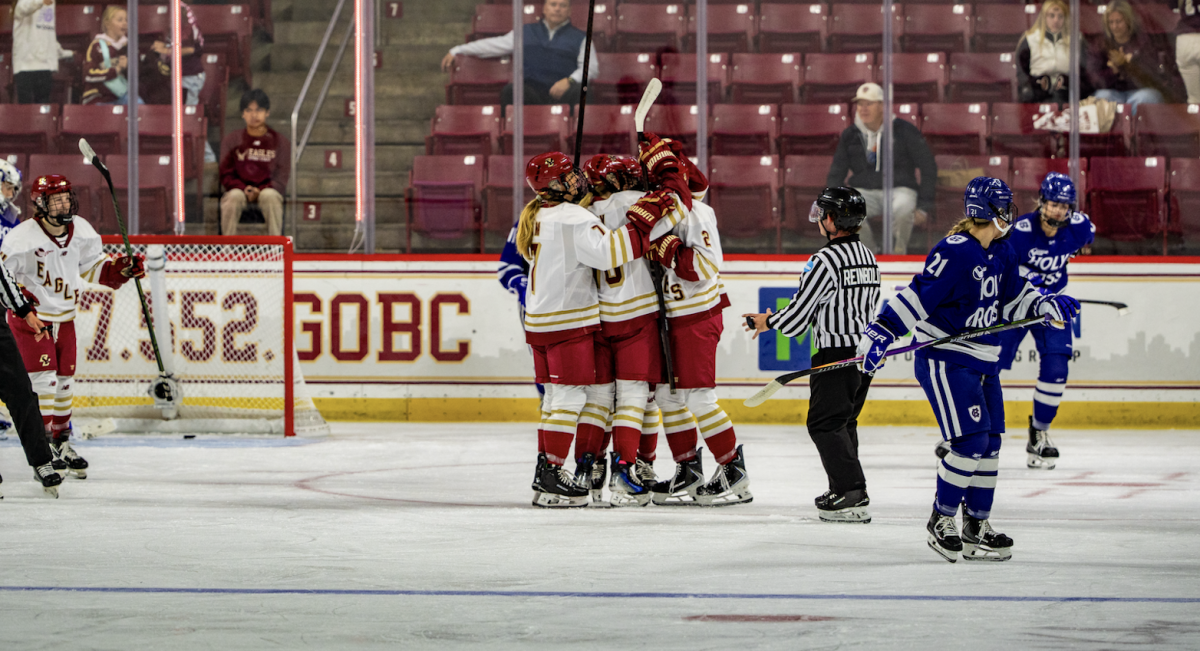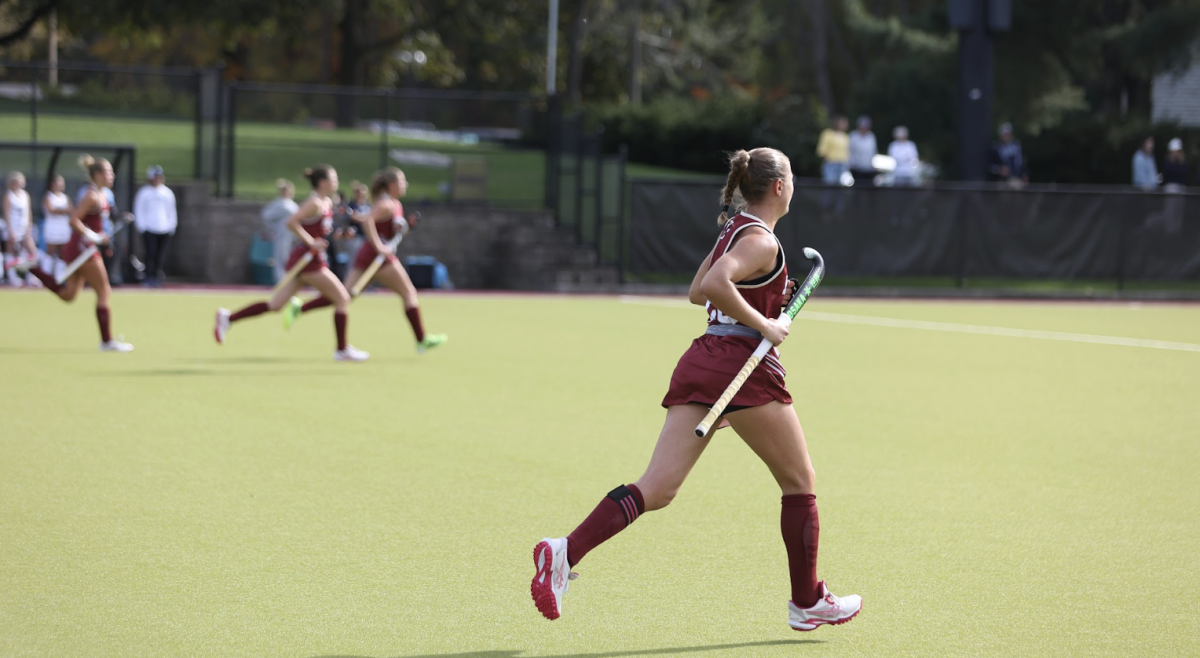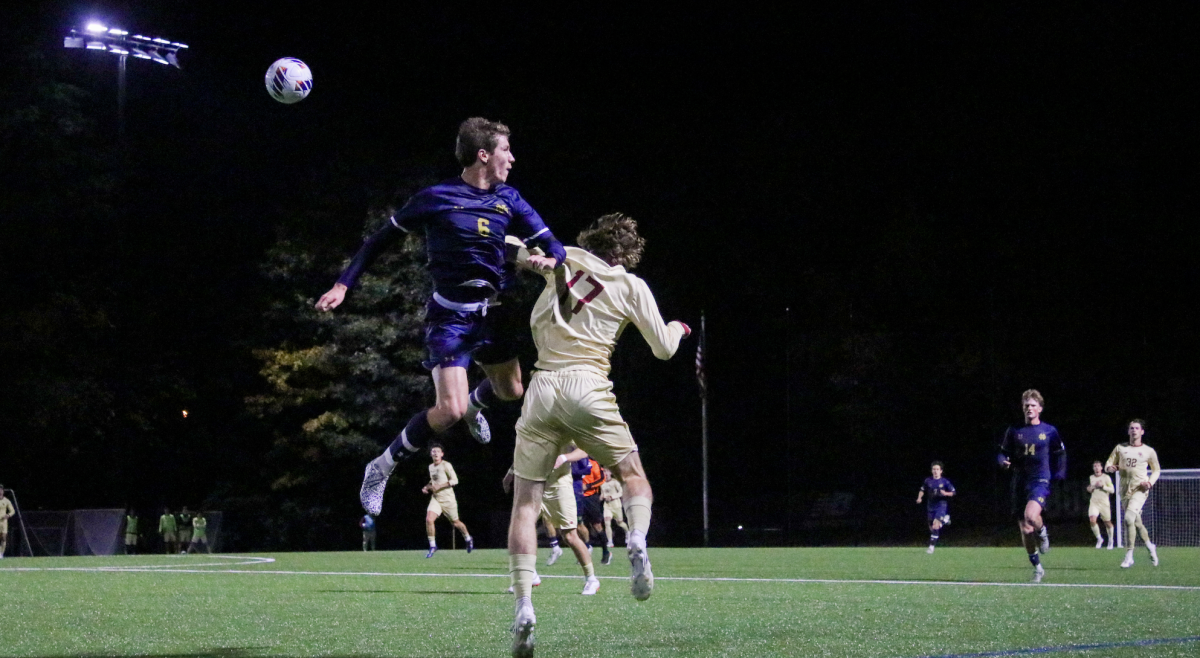Sports editors Emma Healy, Asa Ackerly, and Ethan Ott each answer some of the biggest questions about the upcoming Boston College football season.
Who is BC’s most important player?
Emma Healy: If I had the option to pick the entire offensive line, I would. But for the sake of argument, I’ll go with returning All-ACC right tackle Ben Petrula, who enters his fifth year of starting for the Eagles, including 48 consecutive games started. The obvious reason to choose Petrula as BC’s most important player is that the Eagles’ success hinges on the success of the offensive line. Quarterback Phil Jurkovec showed last year that he has plenty of arm talent, but his release time and decision making needs some work. A successful and cohesive offensive line will help with that timing. Because of Petrula’s unmatched experience, he—in an ideal scenario—will help the line gel and be able to offer help to some of the younger players on the line such as Christian Mahogany. The less obvious reason to choose Petrula here is for the future of the program. He’s in his last year at BC, and after developing this year’s five starters for the last few years, the majority of them will be gone next year. It’s as much on the coaching staff as it is on Petrula and his fellow veterans to make sure that BC’s O-line doesn’t just evaporate after this season.
Asa Ackerly: Of course, the easy answer is Phil Jurkovec here, but I’m going to go a different direction. Jurkovec is a relatively known quantity. While he will hopefully progress on the back of another year in the Eagles offense and full, normal offseason, BC fans know what he is: a dynamic quarterback who frequents with spells of inaccuracy and indecision. Isaiah Graham-Mobley comes with none of this certainty. He was very effective in spurts throughout his four-year career at Temple but suffered year-ending injuries in both of the past two seasons and is an unknown entity on the Heights. With large swaths of the front seven gone, BC needs Graham-Mobley to secure the middle of the defense and use his experience to ensure basic competence against the run. BC’s offense is more than capable of putting up 35 points a game to compensate for a generous rushing defense, but things would be much easier if that was not necessary.
Ethan Ott: While it is hard to pinpoint one specific player, the most important aspect of BC’s 2021 season is its offense. In 2020, that offense orbited around a strong receiving core featuring Hunter Long, Zay Flowers, and CJ Lewis among others. BC will have a successful season if it can continue and even further its explosive passing game, and the most explosive name on BC’s roster is Flowers. Flowers broke out last season with 892 yards and nine touchdowns while leading BC in both of the above categories. When the 2021 Heisman odds were announced at the beginning of this year, one BC player made the list. Unsurprisingly, it was Flowers. Flowers is not Jurkovec’s only weapon downfield this year—he is actually just the highlight of an extremely deep receiving core—but he is the fastest and most proven of the group. If Flowers can pick up where he left off last season, BC’s passing game will thrive. If BC’s passing game can thrive, the Eagles will find themselves winning more games than can be counted on one hand this season.
Who is an underrated BC player that will have a big impact?
EH: BC is not known for its strength in the secondary. Still, defensive backs is one of the position groups least changed from a season ago. Despite the secondary struggles, Brandon Sebastian was one of the bright spots, but he often didn’t get the recognition he deserved. His 99-yard house call on a fumble recovery against Clemson comes to mind, though most of his game-changing plays flew under the radar. If Sebastian can take another step forward this year, BC’s secondary should take a step with him.
AA: Cam Horsley. This pick is as much a plea as it is a testament to Horsley’s potential. The Eagles’ rush defense struggled last year, allowing a generous 4.7 yards per carry, and lost its two mainstays on the center of the defensive line with the transfer of Luc Bequette and loss of Chibueze Onwuka to injury. Horsley played well as a rotation defensive linemen last season and beat out Temple transfer Khris Banks for the starting defensive tackle spot. Banks was strong on the Owls’ defensive line, proving the promise that the Eagles coaching staff sees in Horsley.
EO: While he certainly would not have qualified as underrated two years ago, Kobay White has managed to slip under the radar of most BC pundits. It is easy to get lost in the depth of BC’s receiving options, but White’s upside should not be ignored. After making the preseason All-ACC team in 2019 and leading BC in receptions and receiving yards, White was sidelined for the entirety of 2020 with an ACL injury. Just two years ago, White was the star of BC’s offensive core and now he is listed on the depth chart as WR-X No. 2. One can only speculate about the effect that White’s injury could have on his play this season, but assuming he is back and healthy his impact should be felt in a major way.
What’s the best-case scenario for the Eagles?
EH: It’s not outrageous to imagine that BC could go 11-1. The Eagles might have the most favorable schedule in the ACC, if not the entire FBS. Starting out with Colgate, UMass, and Temple will be just the opportunity BC needs to ease into an overhauled defense and a much less “vanilla” playbook than it employed last year. Clemson, of course, is the ever-present looming threat. Still, I don’t think that Clemson can mark a win in its calendar for Oct. 2 just yet. The Eagles have all the pieces to put up a fight—just like they did last year—it’s now just a matter of whether they can put them together.
AA: With this weak of an out-of-conference schedule and the continued uncertainty surrounding pretty much every ACC team outside of Clemson, anything is possible for the Eagles this year. BC could be a very mediocre team in 2021 and still win seven or eight games. If the offense can continue its strong play from last season and the defense can take a step, the Eagles could do even better. Clemson aside, every game on this slate is winnable. As is typical in conferences chock full of a lot of bad teams or a lot of good teams, it will be toss-up game after toss-up game for the Eagles. A good BC team could take five or six of those matchups. Throw in a win against a sputtering Syracuse program and toss in the three out-of-conference “gimmie” games and that’s a 10-win season. At least one of the ACC’s middle class will take a big step this season, and it could just as easily be the Eagles as anybody else.
EO: The best way to approach BC’s 2021 season is game-by-game. Luckily, there are only 12 games—three of which hardly count. Those three? BC’s opening slate of Colgate, UMass, and Temple. Essentially, the Eagles are starting their season 3-0. BC’s 2021 season really starts on Sept. 25 when Mizzou comes to Chestnut Hill. That game could go either way, but since this is the best case scenario I’ll give the win to the Eagles. BC’s first loss should come just one weekend later against Clemson. After jumping out to a 4-1 record, BC faces NC State, Louisville, Syracuse, and Virginia Tech. The Eagles very well could win all of those games, and again, since this is the best-case scenario, say they will. BC plays three of its last four games at home, squaring off against Virginia Tech, Georgia Tech, Florida State, and Wake Forest. As much as I would like to give all four to BC, I don’t think that would be responsible. Instead, I will predict a Wake Forest loss at home in the final game of the regular season. The end result? An optimistic 10-2 record for the Eagles in the very best possible scenario.
What’s the worst-case scenario for the Eagles?
EH: It’s hard to find a downside in this year’s team. Problems could arise in run defense, as they have in the past, because of BC’s new-look front seven. Losing two starting linebackers—Max Richardson and Isaiah McDuffie—and replacing them with one transfer and another true sophomore bodes poorly. Still, BC has the kind of explosive offense that can put up big numbers to balance out a porous run defense. I think in the absolute worst-case scenario, BC’s losable games are Missouri, Clemson, Virginia Tech, NC State, and Florida State, putting the Eagles at a sunny 7-5. Not bad for a team in the second year of a rebuild, and that scenario would finally break the Eagles’ decades-long drought of having six wins or fewer.
AA: Even being pessimistic it’s hard to see this season going too far off the rails, but let’s give it a try. Say theoretically that Jurkovec succumbs to the indecision and accuracy issues that plagued him at times last season, the O-line once again fails to turn continuity into productivity, and none of the Eagles’ new faces at running back are explosive enough for the issues up front. On the defensive side, expanding the scheme past the “vanilla” gameplan of last year does little to aid an inexperienced front seven. A porous defensive line and linebacker corps leaves the Eagles open to ground assault, and the secondary is still prone to giving up big plays. Even with all of those doomsday scenarios, six wins seems easily within reach. That’s what happens when you face four of the top-20 worst teams in the country. While six wins would be a disappointment given the Eagles’ returning production and weak slate, it would be a respectable result. Hafley put the Eagles a year or two ahead of schedule in Year 1. He can take a rest in Year 2 and still have the Eagles poised for a breakout season down the road.
EO: In 2020, BC succeeded with its pass-heavy offense and defense that managed the bare minimum. I figured that out from my living room couch behind the Saturday crossword and a bowl full of chips and guac. While I do not mean to undersell my football expertise, BC will face at least 12 head coaches this year whose view of the TV was less protruded than mine. If teams can put a stop to what worked for the Eagles last season—namely their passing attack—then BC is in for a long 12 games. With that being said, BC does not face a particularly challenging schedule. Many of the ACC’s best teams do not appear on the Eagles’ schedule this season, giving them some room for error. Losses to Clemson, Mizzou, NC State, Wake Forest, and either Virginia Tech or Louisville seem possible in BC’s worst case scenario, dumping the Eagles out on the curb with a still decent 7-5 overall record at the end of the regular season.
How do you see the season ending?
EH: I think that 9-3 is not an unreasonable expectation. As I mentioned, Clemson is one of the few challenges on BC’s schedule. Plus, BC’s conference slate is about as favorable as it could be: Four of BC’s six ACC Atlantic opponents were ranked below the Eagles in the College Football News preseason rankings. The non-conference slate, which we’ve discussed ad nauseum, is even more straightforward. If BC enters Death Valley on Oct. 2 undefeated at 4-0 with a full head of steam, a win over Clemson isn’t off the table. Still, Hafley is in just his second year at the helm, and with a new-look defense and a young quarterback, the Eagles are bound to drop some toss-ups. I don’t see them losing more than three.
AA: 8-4. Even if the new faces and a more complex scheme fail to take on the defensive side, there is just too much proven talent coming back on offense for this Eagles team to not get to seven or eight. Jurkovec and his receivers can take another step forward with another year in the offense together and a full, normal offseason. The offensive line should fare much better than last season as they shuffle back to their 2019 alignment, giving the Eagles a dangerous, multi-faceted attack. There are glaring questions across the defense, but Hafley deserves the benefit of the doubt after the stellar job he did at Ohio State and the improvements that the BC defense mustered last year. BC chews up the first three games of its slate, squeaks out a win over Mizzou, looks competent against Clemson, and ping pongs wins and losses the rest of the way.
EO:
With most of the 2020 team returning this year, BC should be as strong if not stronger than last year’s team was. Last year, the Eagles went 6-5 against a more difficult schedule than this year’s. At minimum, the Eagles should win seven games, but I expect the real number to be higher. I would predict a BC loss to Clemson, and a fight against Mizzou and two other opponents—be it NC State, Wake Forest, or Virginia Tech. There is not a huge gap between what BC could do this season and what it should do this season, as the outcomes of four of its games are essentially set in stone. My hope for the 2021 Eagles is a 9-3 season, but realistically I would predict an 8-4 season and the first winning record for BC in ACC play since 2009.
Featured Image by Dennis Nett / Syracuse Post-Standard via ACC Media


